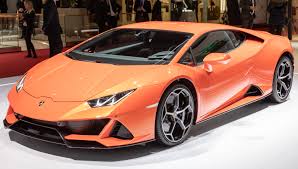26 November 2020
Backfiring
Fast cars and young girls.
By Neil Tidmarsh
 A few months ago, a state trooper stopped a car which was being driven erratically along a road in Utah. The driver was five years old and he was on his way to California to buy a Lamborghini. He’d grabbed his savings (three dollars, which he proudly showed to the officer), ‘borrowed’ his dad’s car and set off west, inspired by the Lamborghini videos he’d seen on YouTube.
A few months ago, a state trooper stopped a car which was being driven erratically along a road in Utah. The driver was five years old and he was on his way to California to buy a Lamborghini. He’d grabbed his savings (three dollars, which he proudly showed to the officer), ‘borrowed’ his dad’s car and set off west, inspired by the Lamborghini videos he’d seen on YouTube.
It wasn’t the only troubling story in the news this week about Lamborghinis and the under-aged. A new advertising campaign for the car has just been shot in Palermo, Sicily, by one of Europe’s most respected photographers, Letizia Battaglia. Her photographs of Sicilian street life and mafia crime scenes shot her to fame in the 1980’s. She’s now 85 years old, and it’s admirable that she’s still working at such a grand old age – but not so admirable that the model she used in this recent campaign was considerably younger. Some seventy-odd years younger. A mere adolescent, in fact, and somewhat scantily clad.
The mayor of Palermo objected. “These images send the wrong message” he said, after praising Ms Battaglia’s other Sicilian work. “I don’t approve of using the bodies of women and children for commercial work.” A storm of objections from elsewhere swept across social media. Lamborghini scrapped the adverts.
Ms Battaglia remained unrepentant, however. “I am very upset about this reaction” she was quoted in Corriere della Sera, “since, for me, Palermo is a young girl with an innocent expression who is growing up.”
It’s difficult to believe that such a world-class commercial outfit and such a renowned artist could be so deaf and blind to the spirit of the times. Such a campaign, now, in 2020, in the aftermath of the Harvey Weinstein scandal, the Jeffrey Epstein scandal, the MeToo campaign and everything that came in its wake, had to be a huge mistake, a massive misjudgement. A cynical bid to grab no-such-thing-as-bad publicity, perhaps? Surely not – you can hear the deafening sound of backfiring (as of a hundred clapped-out sports cars) echoing all around this story.
Another report in the news this week emphasised just how mis-judged Lamborghini’s Sicilian venture was. A survey conducted by a children’s charity (Plan International UK) and a campaign group (Our Streets Now) has revealed that girls and young women aged 14 to 21 are suffering an extraordinary level of sexual harassment on our streets. Over one thousand girls in the age group were polled: 51% of them had experienced harassment in public this summer; 19% of them had experienced being “catcalled, followed, groped, flashed or upskirted” even during the spring lockdown. One thousand parents were also polled: 32% of them reported that their daughters had told them that they’d experienced harassment in the streets.
Two sisters, Gemma and Maya Tutton (aged 15 and 21), were moved by their own experiences to found Our Streets Now, which campaigns to make street harassment a criminal offence. As well as the report, they have also launched a petition which a quarter of a million people have already signed. “We want to create a society in which harassment is no longer a ‘normal’ part of being a girl” they said this week. “Our research released today shows the urgency with which this problem must be tackled.”
The journalist Helen Rumbelow followed these findings with an article in The Times about the everyday incidents of harassment – verbal and physical – experienced in the streets and on public transport by herself and her friends when younger and increasingly by their young daughters and their friends today. All of a sudden that controversial new book I Hate Men written by the young French blogger Pauline Harmange and just published in the UK (“I hate men. All of them… Hating men and all they represent is absolutely our right…”) doesn’t seem quite so controversial after all.

But perhaps I should end with something a bit more positive for both Lamborghini and the male of the species. The Italian police and a Lamborghini Huracan (and what could be more macho than that combination?) gave us some good news this week. The Highway Police routinely save lives by rushing donor kidneys from one end of Italy to the other, in cars specially fitted with a refrigerated baggage compartment. A few months ago they took a kidney on an urgent 540 mile journey, from Bari in the deep south all the way to Pavia in the north, where it was needed. And this week they dashed a kidney from Padua to Rome – a 300 mile journey – in a little more than two hours (cutting three hours off the normal journey time), driving at an average speed of 145mph in a Lamborghini Huracan (610 horsepower engine; top speed 200mph; 0 – 60 in 2.8 seconds).
The recipients of those kidneys must think that the uomini of Italy’s Highway Police are more deserving of amore than odio, surely.

